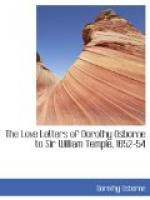There is no honest biography of Stephen Marshall. In the news-books and tracts of the day we find references to sermons preached by him, by command, before the Army of the Parliament, and we have reprints of some of these. I have searched in vain to find the sermon which Dorothy heard, but it was probably not a sermon given on any great occasion, and we may believe it was never printed. There is an amusing scandalous tract, called the Life and Death of Stephen Marshall, which is so full of “evil speaking, lying, and slandering,” as to be quite unworthy of quotation. From this we may take it, however, that he was born at Gormanchester, in Cromwell’s county, was educated at Emmanuel College, Cambridge, and that before he came to London his chief cure of souls was at Finchingfield in Essex. These, and the records of his London preaching, are the only facts in his life’s history which have come to my notice.
My Lord Whitelocke did go to Sweden, as Dorothy surmises; setting sail from Plymouth with one hundred honest men, on October 26, 1653, or very soon afterwards, as one may read in his journal of the progress of the Embassy. That he should fill this office, appears to have been proposed to him by Cromwell in September of this year.
An Act of Parliament to abolish the Chancery was indeed passed in the August of this year. Well may Lord Keble sore lament, and the rest of the world rejoice, at such news. Joseph Keble was a well-known law reporter, a son of Serjeant Richard Keble. He was a Fellow of All Souls, and a Bencher of Gray’s Inn; and, furthermore, was one of the Lords Commissioners of the Great Seal from 1648-1654. There was “some debate,” says Whitelocke, “whether they should be styled ‘Commissioners’ or ‘Lords Commissioners,’” and though the word Lords was far less acceptable at this time than formerly, yet that they might not seem to lessen their own authority, nor the honour of their office constituted by them, they voted the title to be “Lords Commissioners.”
SIR,—If want of kindness were the only crime I exempted from pardon, ’twas not that I had the least apprehension you could be guilty of it; but to show you (by excepting only an impossible thing) that I excepted nothing. No, in earnest, I can fancy no such thing of you, or if I could, the quarrel would be to myself; I should never forgive my own folly that let me to choose a friend that could be false. But I’ll leave this (which is not much to the purpose) and tell you how, with my usual impatience, I expected your letter, and how cold it went to my heart to see it so short a one. ’Twas so great a pain to me that I am resolv’d you shall not feel it; nor can I in justice punish you for a fault unwillingly committed. If I were your enemy, I could not use you ill when I saw Fortune do it too, and in gallantry and good nature both, I should think myself rather obliged to protect you from her injury (if it lay in my power) than double them




